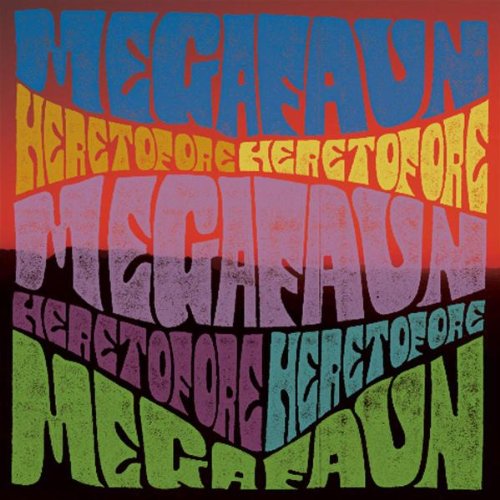
Megafaun
Heretofore
Release Date: Sep 14, 2010
Genre(s): Pop/Rock, Alternative/Indie Rock, Alternative Pop/Rock, Alternative Country-Rock, Roots Rock
Record label: Hometapes
Music Critic Score
How the Music Critic Score works
Buy Heretofore from Amazon
Album Review: Heretofore by Megafaun
Very Good, Based on 7 Critics
Based on rating 4/5
When I interviewed Megafaun’s Phil Cook in April, the band had just written and recorded Heretofore within the space of six weeks. I was lucky enough to get my hands on an unmastered version of the short LP, and even in that raw-ish form, their grounding in “roots music” — the one that somehow incorporated their high school jazz band beginnings with a love of folk and bluegrass — mixed as obviously as ever with a commitment to pushing boundaries. Cook spoke about the balance between tradition and experimentation, the trust between the band’s members, and winning people over by not taking themselves too seriously.
Based on rating 8.0/10
Megafaun’s first two albums, 2007’s Bury the Square and 2009’s Gather, Form & Fly, cemented the North Carolina trio as purveyors of lackadaisical porch-front Americana with a sound steeped in Appalachian folk, pure country, and the blues. Yet even as they explored traditional verse-chorus-verse songcraft though, they also displayed a penchant for experimentation and improvisation, as evidenced by songs like the stream of consciousness journey, “Impressions of the Past. " A lazier band might have coasted on the acclaim that Gather garnered, but Megafaun hasn’t slowed a bit, canvassing the world on a grueling regimen of touring.
Based on rating 8/10
Megafaun has famous friends. At this point in their careers, Joe Westerlund and brothers Brad and Phil Cook (all multi-instrumentalists, singers, songwriters, and proud beard owners) are far more well-known for their collaborations and one-offs than their own brand-name works. Besides releasing two quietly acclaimed albums (2008’s Bury the Square and 2009’s Hometapes debut Gather, Form, & Fly), this North Carolina-based trio has recorded, toured, and collaborated with the likes of Akron/Family, the Dodos, and, most famously, Bon Iver.
Based on rating 7.7/10
That's a pretty evocative title for a mini-album like this one, which follows Megafaun's breakthrough full-length, Gather, Form & Fly. The word itself suggests the present moment as the point of intersection between the past and the future, which is exactly where the North Carolina trio find themselves. They tease out old ideas and combine them with new ones, affixing Appalachian folk to classic rock, ambient, avant garde, and a kind of musical entropy that pushes many of their songs into sputtering, oddly compelling noise.
Based on rating 7/10
On their third album, Megafaun in essence refine themselves further -- which given that they were never entirely either a neo-folk act or a crew of random experimenters might sound a bit hard to pull off. But the six-song Heretofore breaks down fairly neatly into a clutch of songs where the more unsettled side of the band's work exists as shading to fairly formal compositions and one big song where that overtly exploratory side is front and center. Said song, with the slightly unwieldy title of "Comprovisation for Connor Pass," starts off as a fairly pretty piece until about five minutes in; if what follows isn't John Coltrane's Ascension by any stretch of the imagination, it does suggest the glazed spaciousness that much jazz from that era offered as its impact continued to play out, a new riff on what acts like Talk Talk and Bark Psychosis did with similar inspirations in the '90s.
Based on rating 2.5/5
Megafaun’s latest effort, Heretofore, is the band’s most ambitious set to date, a collection of six songs that clocks in at just over half an hour. Unfortunately, it’s also the first project on which their ambition at times exceeds their grasp. Adding the “prog” tag to anything is a tricky proposition; it requires dead-on editorial instincts to filter out indulgent asides and to remain focused on a singular vision.
Based on rating 4/10
Other than their talent in writing catchy or meaningful songs and their subsequent emotional impact on your psyche, there’s usually one thing, an x-factor or a gimmick, about a band that catches your interest and becomes the focus point of your love and admiration. For members of the KISS Army, it might be the makeup, the mythos, or Gene Simmons' seven-inch tongue. For Sonic Youth disciples, waves of distortion and feedback may be sweeter than their mother’s voice.
'Heretofore'
is available now

